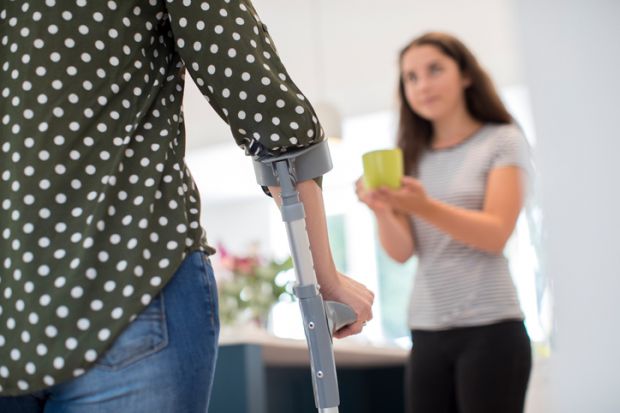Young carers are 38 per cent less likely to gain university degrees than those without caring responsibilities, new research shows.
A study, shared with Times Higher Education by UCL researchers, examined up to 10 years of data from more than 27,000 young adults in the UK aged between 16 and 29.
The results showed that young people who provide informal unpaid care to family members or others outside their households were on average 38 per cent less likely to obtain university degrees than others with no caring responsibilities.
The research team found that the more hours they spent caring, the less likely young people were to get degrees – with those who cared for 35 or more hours a week 86 per cent less likely to obtain qualifications.
Senior author Anne McMunn said being a young adult carer could set a person on a “long-term path of disadvantage”.
“To prevent this, we need to identify young carers early and ensure they are supported within education so they have the same life opportunities as their peers,” she added.
The study, published in the journal Advances in Life Course Research, also found that having a degree protected against the negative effects of caring on the likelihood of being in work.
Those caring for between 10 and 19 hours a week with degrees were found to be 6 per cent less likely to enter work than non-carers, while their counterparts caring for the same amount of time but without degrees were 26 per cent less likely to enter work.
The influence on the likelihood of unemployment was found to be stronger for female carers than for male carers.
“Young people who provide care for family members have often been overlooked in research and policy,” said lead author Baowen Xue.
“But the disruption of providing care comes at a key early life stage, when young carers might be starting at college or university, or entering employment for the first time.”
The research provided new evidence about the consequences that caring can have on young people’s work and education prospects, added Dr Xue.
Figures from the Office for National Statistics show that about one in 10 young people aged between 16 and 30 in the UK provide informal care to family members or others.
For the study, the researchers analysed data from the UK Household Longitudinal Study, a nationally representative population sample.
They found that, compared with those who had no caring responsibilities, young carers were more likely to come from disadvantaged, lower-income households.
One in ten were caring for 35 hours or more a week, a fifth were caring for 20 hours or more a week, and almost half cared for fewer than five hours a week.
Mostly they were caring for parents (45 per cent) or grandparents (35 per cent), but 37 per cent said they were caring for other people, such as friends or other relatives.




